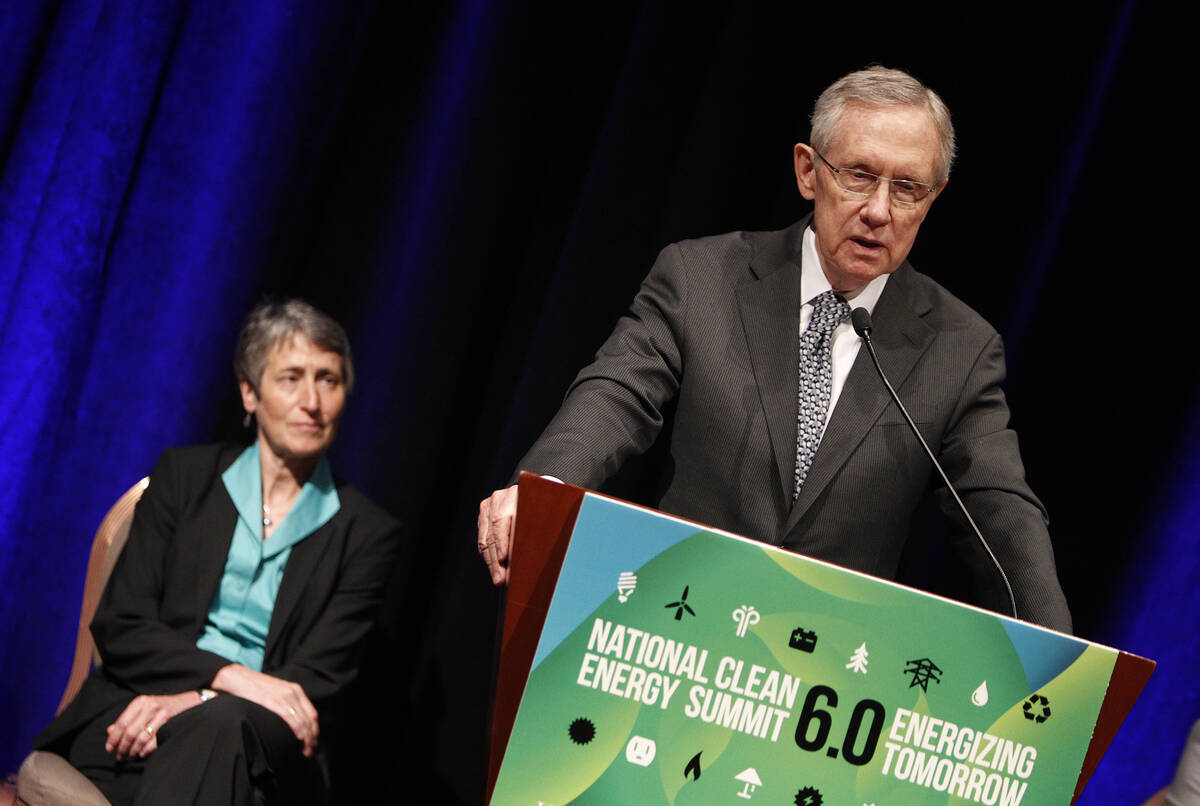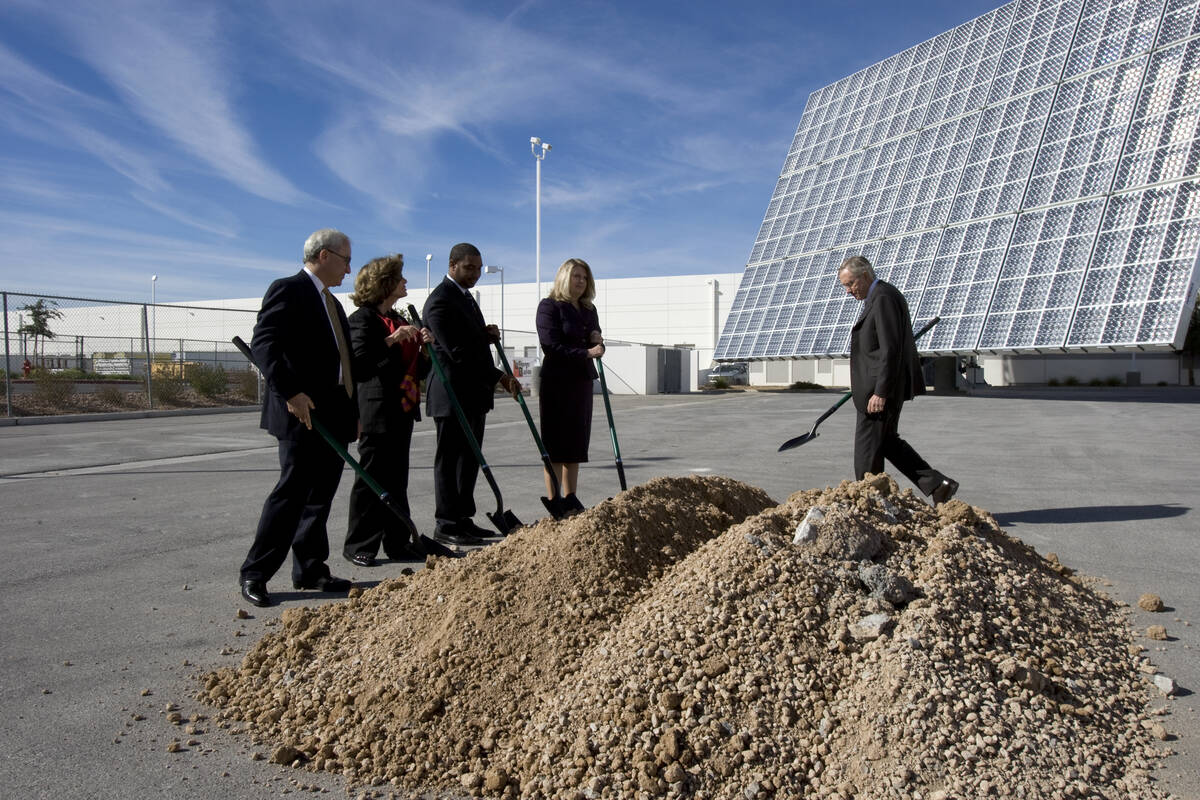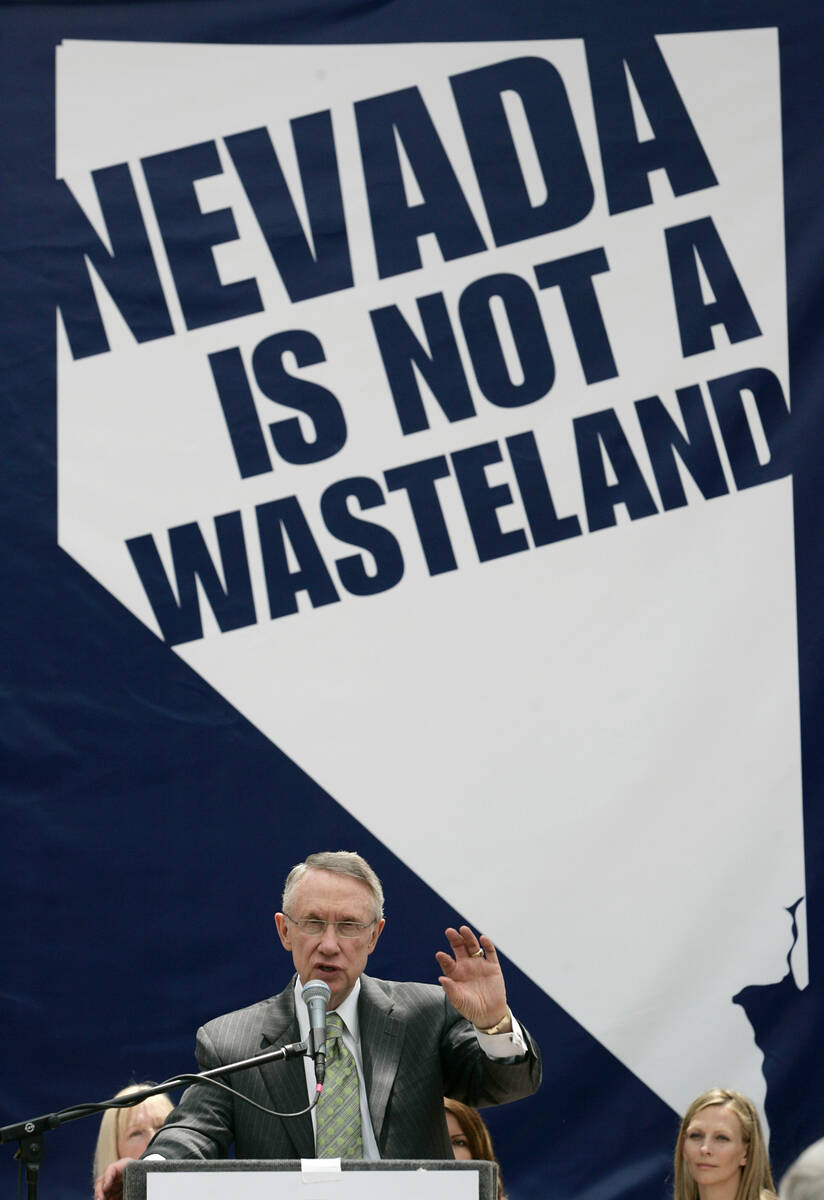Inside Harry Reid’s lasting, and complicated, environmental legacy
Piute Springs was nothing like where former U.S. Sen. Harry Reid spent his childhood.
Pools of water created an environment friendly to lily pads and cattails. Cottonwoods and willows lined a small stream. It was a lush oasis deep in the harsh terrain of the Mojave Desert.
The springs were a special place for Reid when he was a boy, UNLV historian Michael Green said. But by the time he took his wife, Landra, to see it, the area had essentially been destroyed.
It was that place, so different from the barren land of his native Searchlight, that sparked Reid’s interest in preserving the environment.
Reid died Dec. 28 at age 82, leaving behind a legacy of securing millions of acres of protected wilderness, creating Nevada’s first and only national park and keeping nuclear waste out of Yucca Mountain.
“I am hard-pressed to think of anyone Nevada has elected to office who ranks with him in protecting the environment,” Green said.
When Reid took office, Green said, Nevada had fewer than 70,000 acres of wilderness. It now has millions.
He helped steer the state away from coal and settled a longstanding dispute over water rights in the Truckee River. He brought national leaders to an annual clean energy summit and encouraged then-President Barack Obama to protect Gold Butte and Basin and Range with national monument designation.
But legacies can be complicated things.
“Sen. Reid was an enigmatic figure who has a bunch of Nevada-sized contradictions on his environmental scorecard,” said Kyle Roerink, executive director of the Great Basin Water Network.
Reid championed legislation that traded urban development for environmental protection, was friendly to mining interests, as Nevada politicians tend to be, and he backed a controversial proposal to pipe water from rural Nevada to Las Vegas in an effort to bolster the urban water supply.
“That water could be used to flush toilets on the Strip,” Reid told the Las Vegas Review-Journal after he left office. The project has since been shelved.
A history of compromise
Reid’s political career is marked by a record of pragmatism and compromise.
“On the environment, some people might say he was too willing to compromise,” Green said.
As a congressman, Reid was the driving force behind the creation of Great Basin National Park, finalizing protection for an area that Nevada lawmakers had tried and failed to protect in the past.
To get the park across the bureaucratic finish line, Reid agreed to scaling the size back from his original proposal of 129,000 acres to 77,000 acres. He also allowed for rules and regulations that favored ranching and mining, Green said.
“That was a biggie,” former U.S. Sen. Richard Bryan said of Reid’s national park efforts. Bryan and Reid would go on to serve together in the U.S. Senate for more than a decade.
In a 2020 documentary by KCET, Reid said he allowed for grazing and made the park “smaller than it should have been” in a compromise with then-U.S. Sen. Paul Laxalt.
“I got it passed,” he said.
In the U.S. Senate, Reid worked to negotiate a settlement on how water from the Truckee River would be allocated between tribes and other entities, leading to the restoration of Pyramid Lake, a body of water economically important and sacred to native people.
The fight over the water from the river had raged for decades, but Reid got the deal done, jumping in the air and clicking his heels when an agreement was reached, Green said.
Trading sprawl for protection
Patrick Donnelly, Great Basin director of the Center for Biological Diversity, said Reid’s environmental legacy is still in flux, but will become clearer in coming decades. Part of that legacy might be restoring Walker Lake in Mineral County, he said.
“Perhaps Las Vegas continues sprawling out into the desert and connects all the way down to California,” he said. “Well, that could also be a consequence of that legacy.”
The Southern Nevada Public Land Management Act, legislation Reid co-sponsored in the U.S. Senate, has generated nearly $4 billion from public land sales in Southern Nevada for use on special projects, including environmental protection and restoration.
U.S. Bureau of Land Management spokeswoman Kirsten Cannon said the legislation represents an unparalleled collaboration between federal, state and local partners, leading to significant improvements across some of Nevada’s most visited areas, including Lake Tahoe and Lake Mead National Recreation Area.
Former U.S. Sen. John Ensign, who as a congressman co-authored the legislation with former U.S. Sen. Richard Bryan, said the program was the most significant thing he worked on with Reid in his time at the U.S. Capitol. Ensign eventually served with Reid for a decade in the U.S. Senate, taking environmental protection efforts from the legislation to what he described as “the next degree.”
“Those have done more good for the state of Nevada than anything else that we could have ever done,” Ensign said.
But Donnelly said the late senator’s work on lands bills have fueled the type of irresponsible development that has created new carbon emissions and led to a warming climate. A new proposal in Congress would make public land outside the Las Vegas Valley available for development in exchange for greater protection in other areas.
And the effects of sprawl development, he said, are not canceled out by wilderness designation.
“All the wilderness designation in the world isn’t going to stop the climate crisis,” Donnelly said.
Sometimes blunt, forceful
During Reid’s 2012 clean energy summit, the former senator bluntly explained his opposition to a coal-fired power plant in Moapa that had operated for decades.
He called on NV Energy to close the Reid Gardner plant, accusing the facility of “literally killing the Paiutes.” The nearby Moapa Band of Paiute Indians had reported illness and even death, allegedly caused by the ash produced by the power plant.
The facility closed in 2017, leaving the state with only one coal-burning plant, which will ultimately be replaced by solar and battery storage projects.
In a statement, an NV Energy spokeswoman said the power company worked closely with Reid to position the state as a leader in clean energy, reducing its carbon emissions by more than 50 percent in the past 15 years, adding more renewable sources and closing coal plants.
“NV Energy has immense respect for the Moapa Band of Paiutes and looks forward to partnering with them, other tribes and local communities to develop additional clean energy projects for the benefit of all who live in Nevada,” the company said.
Nowhere was Reid’s bullish approach to politics more apparent than the fight to stop the storage of nuclear waste at Yucca Mountain.
He once called then-President George W. Bush a “loser” and a “liar” for authorizing the storage of waste after promising on the campaign trail that the decision would be based on sound science. Reid would end up apologizing only for the “loser” part of his comments.
At Reid’s urging the Obama administration scrapped the plan for the project.
A new era of priorities
Reid was instrumental in ushering in a new era of priorities for Western politicians, said Christian Filbrun, a doctoral fellow at the University of Nevada, Reno who is studying Reid’s legacy.
“He was somebody that really changed the way that Nevada went about looking at public lands, not just as these resources to be extracted, but as places that could be set aside, places that can be protected, places that should be visited,” he said.
Filbrun said Reid’s legacy on environmental issues is one of caring about people and collaboration.
He championed those traditionally underrepresented in Nevada, such as indigenous groups and environmentalists, Filbrun said, and he approached his deal-making with a spirit of not leaving people behind.
“His legacy can not only be seen in the land of Nevada, in all of these places set aside, in all of these kind of deals re-engineered, but in the way that he brought people together, in the way that he made them feel that they had a stake in the land, that the object of unification was this landscape,” Fulbrun said.
Contact Blake Apgar at bapgar@reviewjournal.com or 702-387-5298. Follow @blakeapgar on Twitter.

























